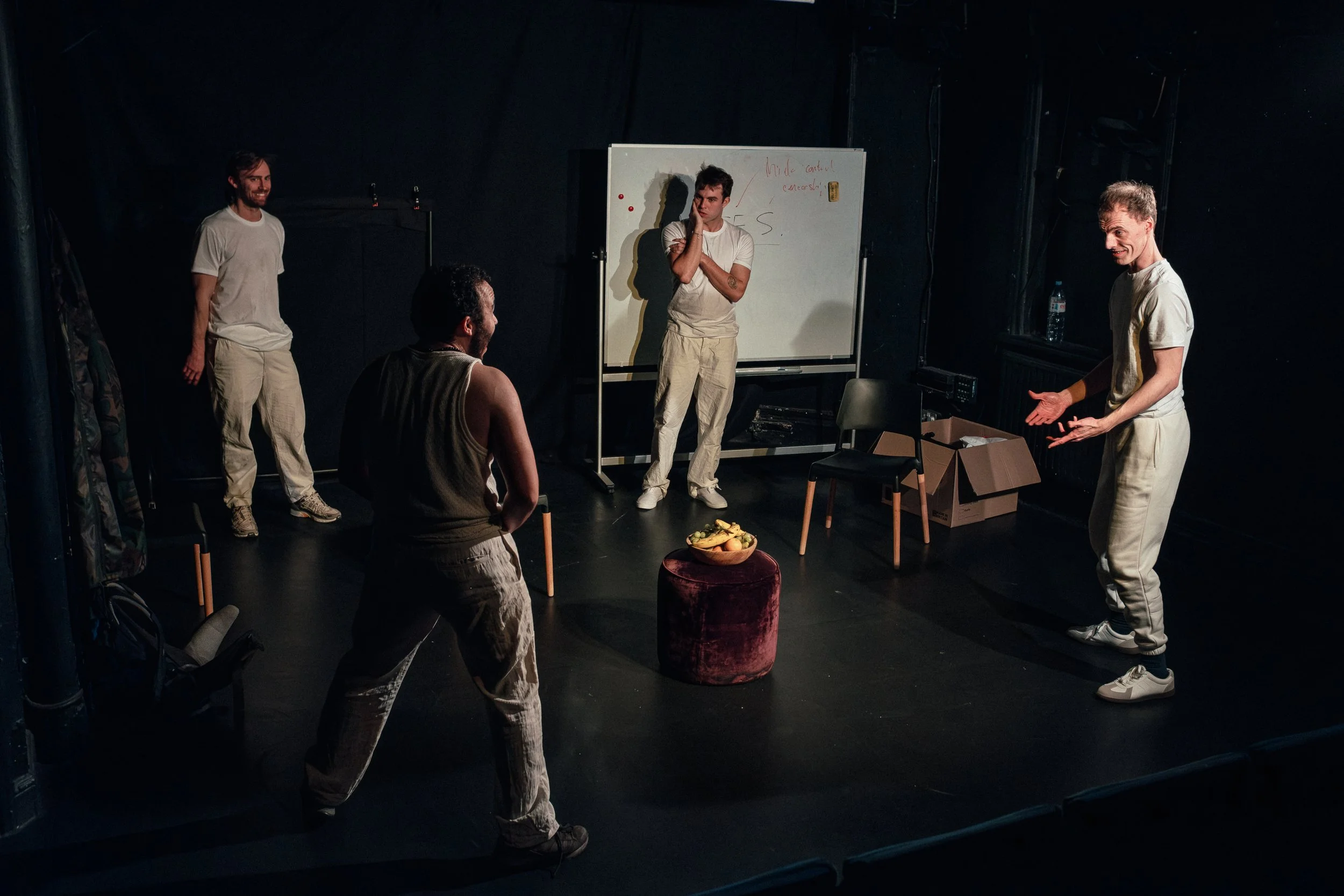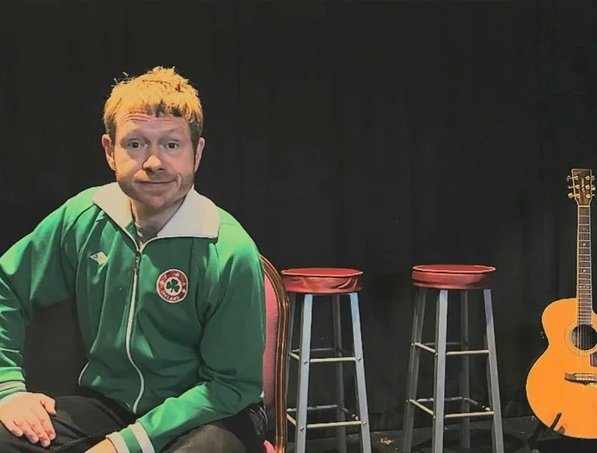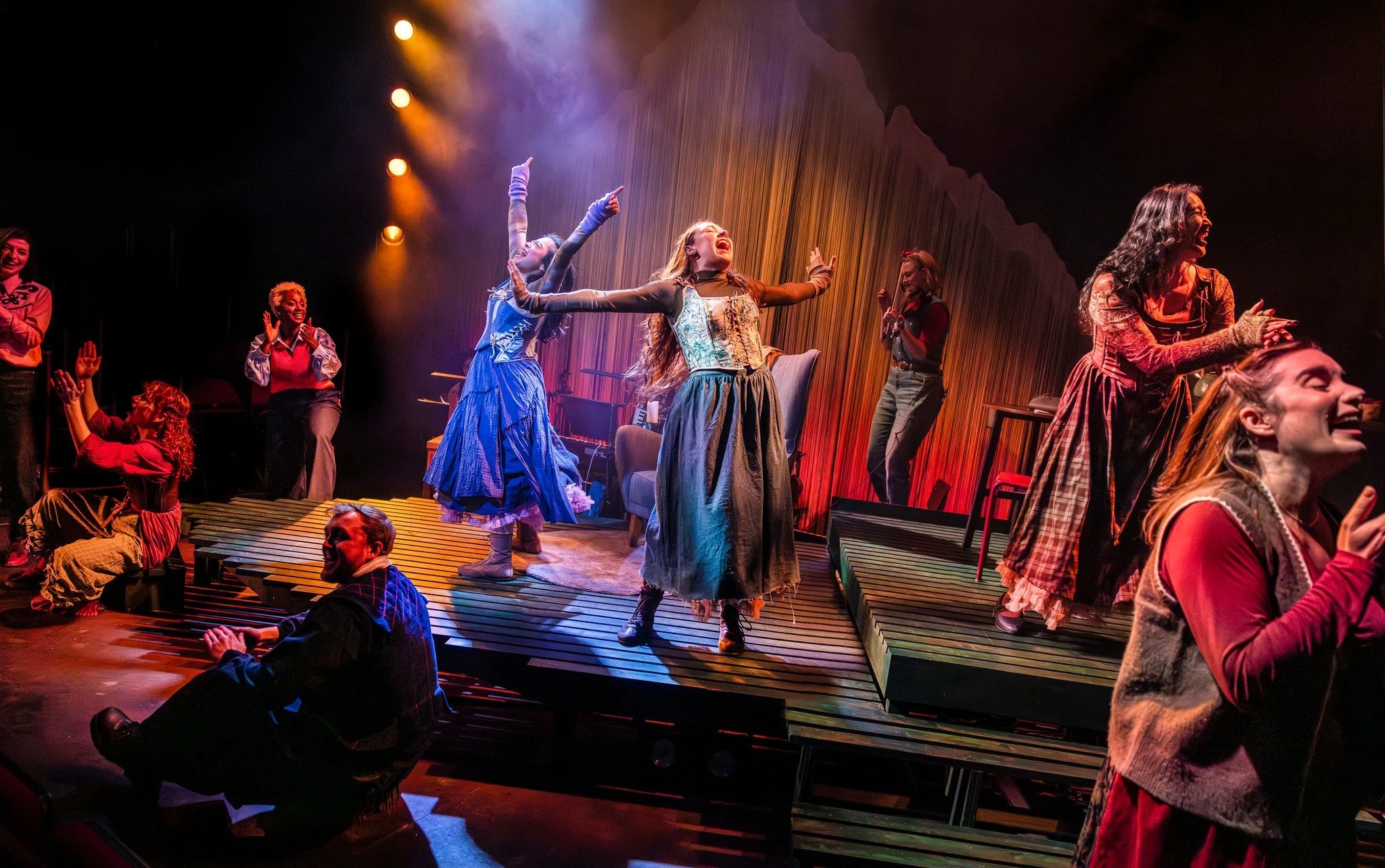Radiant Vermin, Drayton Arms Theatre Review
Written by Penny for Theatre & Tonic
Disclaimer: Gifted tickets in exchange for an honest review.
Radiant Vermin, written by Philip Ridley and produced by the Cellar Door Theatre Company, is a satirical play about the housing crisis which asks how far would you be prepared to compromise your principles to have the perfect home for you and your family?
Following a short run at the Cornerhouse Theatre in Surbiton earlier this year, the production now has a two night stay at the Drayton Arms Theatre in West Brompton.
Entering the auditorium, the lights are already down. The set is a basic black box, with the outline of a house made out of lights on the back wall, with two chairs and two illuminated cubes the only furniture. The lights change as the action intensifies. There’s a projection on the back wall of swirling lights, giving an “out of this world” feel. There’s an eerie sound effect underscoring events, it’s used well throughout the performance and gets your attention.
The play focuses on Ollie (Tom Carter) and Jill (Kimberley Ellis), a young couple with a new baby. Immediately breaking the fourth wall, they address the audience, they have a tale to tell us. It’s about the things they did to get onto the housing ladder, they are keen to tell us that they are GOOD PEOPLE, it’s something they desperately want us to believe, even as we will inevitably judge them for what they have done. They met through their local church. Jill’s mum was a keen volunteer until her health dictated otherwise and Jill was her devoted carer. And Ollie’s dad entertained people at church events, supported by his son. See, they are GOOD PEOPLE.
Currently living in a tiny flat on the rundown Red Ocean Estate, Jill and Ollie are desperate to leave. So when mysterious government employee Miss Dee (Stacy Sobieski) offers them a free house with no obvious strings attached, they jump at the chance. All they have to do is sign a contract, then renovate the property and turn it into a “dream home” to kick start the local property market. The strings soon become obvious and the couple (good people, remember?) decide they are absolutely fine with those strings remarkably quickly.
What follows is a tale of murder and materialism. It’s meant to be a comment on gentrification, the greed that leaves people constantly wanting more, and the treatment of homeless people as sub-human and dispensible. But, given that the characters get past their moral dilemma so quickly, this loses its impact and the morality debate is rather lost amidst the very dark humour and unfolding horror. There’s a supernatural element that is too much of a distraction from the play’s message.
In her programme notes, Director Brittany Rex tells us that Ridley’s script does not provide any stage directions. Whilst this leaves everything open for the director’s vision, I felt that some of her decisions didn’t work. Ollie and Jill are not happy being part of the “underclass” but their accents tell us they are anything but underclass – it doesn’t make sense that this seemingly privileged pair, regulars at Selfridges and devoted readers of luxury home magazines, are struggling so much. It would have made much more sense to present them as a very ordinary couple, as with these cut glass accents and the snobbish dismissal of homeless people as “scum” and “scroungers”, I started with very little sympathy towards them and it only got worse.
There was also a limited use of props – with the actors very effectively miming when they were holding a baby, using their phones or having a drink, for example, but they did use physical props for the contract signed with Miss Dee (a crumpled piece of blank paper) and a plastic fairy wand adapted into a weapon. These look rather amateur in comparison with the simple sophistication of the set.
Towards the end of the play, the couple host a “garden party from hell”, the actors also playing the additional characters of their various neighbours, lured to move to the street by the attraction of Ollie and Jill’s “dream home”. Carter and Ellis do well to jump quickly between all of these characters, but the pace is so frantic at this point that it’s all little overwhelming and lessens the impact of Ollie’s eventual breakdown under the stress of constant “renovations”. It also goes on for too long.
The most successful part of the play came when Sobieski took on the role of a young homeless girl called Kay, meeting with Ellis’ Jill. The scene between the two of them was genuinely heartbreaking and thought provoking, as it appeared as if Jill was finally going to question the morality of what she had become involved in. Unfortunately, the opportunity for some genuine soul searching was missed and the action carried on as before.
There are some commendable and committed performances from the three actors, who manage to sustain their characters and energy throughout the play which, running at just under two hours with no interval, is too long and could easily lose half an hour. But, it doesn’t quite succeed as a warning against the failings of our materialistic society as ultimately Ollie and Jill are not sympathetic characters and the supernatural element is a layer too much and can, at times, make the story confusing or even ridiculous.
☆ ☆










